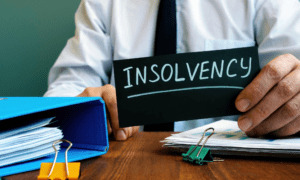When your business is facing financial distress, choosing the right insolvency practitioner (IP) is crucial. An IP can guide your company through difficult financial decisions, providing the expertise needed to either restructure or liquidate effectively. A well-informed choice of IP can make the difference between a smooth financial recovery and a prolonged, damaging insolvency process. This comprehensive guide walks you through everything you need to consider to make an informed decision that serves your business’s needs.
Key Takeaways
- Insolvency practitioners are licensed professionals who manage formal insolvency procedures such as liquidation, administration, and CVAs.
- Always verify an IP’s credentials and licensing through recognized professional bodies like the IPA or ICAEW.
- Choose an IP with experience relevant to your business size and industry.
- Transparent communication, availability, and responsiveness are critical traits to look for in an IP.
- Understand all fee structures upfront—ask for written estimates and what services are included.
- Look for reviews, testimonials, or recommendations from trusted sources before hiring an IP.
- Your relationship with the IP should be based on trust, professionalism, and empathy.
- Consider the IP’s negotiation abilities and their approach to resolving disputes with creditors.
- Proximity can be a plus; however, remote handling is common and often effective.
- A good IP doesn’t just manage a legal process—they offer strategic advice that may help your business recover and thrive.
Understanding the Role of an Insolvency Practitioner
Before diving into the process of selecting the right IP, it’s important to first understand the critical role they play in insolvency proceedings. An insolvency practitioner is a licensed professional who helps businesses navigate insolvency processes, whether that involves liquidation, company voluntary arrangements (CVAs), or administration.
In essence, their job is to act as a neutral party, ensuring that creditors’ interests are balanced with the business owner’s needs. The best insolvency practitioners combine legal knowledge with a pragmatic understanding of the financial pressures you may be facing, guiding you through the necessary steps for resolution. You might also encounter terms like “official receiver” or “liquidator” in relation to the IP’s responsibilities.
Assessing Your Business’s Specific Needs
The first step in choosing an IP is to assess your business’s financial situation and determine the type of insolvency procedure that best suits your needs. There are a few key options:
- Liquidation: If your business is insolvent and unable to continue trading, liquidation may be the best option. This process involves selling off assets to pay creditors.
- Administration: If your business is struggling but still has a chance of recovery, you may opt for administration. This procedure provides temporary protection from creditors and gives you time to restructure the business.
- Company Voluntary Arrangement (CVA): A CVA allows you to negotiate a repayment plan with creditors while avoiding liquidation, giving you a chance to continue trading.
By understanding your options and how each procedure works, you’ll be able to choose an insolvency practitioner who specializes in the relevant areas. Make sure to explain your business’s unique challenges and objectives to the IP upfront.
Verifying Licensing and Credentials
In the UK, it is vital that an insolvency practitioner is licensed by a recognized professional body such as the Insolvency Practitioners Association (IPA) or the Institute of Chartered Accountants in England and Wales (ICAEW). Only those who have met strict educational and professional standards can legally act as an IP.
Before moving forward with an IP, confirm that they hold the necessary qualifications and license. This can often be done by checking their profile on the relevant body’s website. A licensed IP will be fully insured and bound by a code of conduct, offering you additional peace of mind that they will handle your case professionally and ethically.
Evaluating Experience and Specialization
The experience of your insolvency practitioner is one of the most critical factors in ensuring the success of your insolvency process. Different IPs may specialize in various types of businesses or industries. For example, some might focus on corporate insolvencies, while others may have extensive experience with small and medium-sized enterprises (SMEs).
Additionally, the IP’s history with similar cases to yours is important. Have they handled cases of a similar scale or complexity? Do they have a history of successfully rescuing distressed businesses? Take the time to ask them about their previous experiences and case studies to ensure that they are equipped to deal with your specific needs.
Prioritizing Communication and Accessibility
Insolvency can be a stressful and uncertain time for any business owner. As such, it’s essential that you work with an insolvency practitioner who is responsive and clear in their communication. You want an IP who is accessible to address your concerns, answer your questions, and provide updates on your case.
Effective communication also means that your IP should be able to explain complex financial and legal concepts in a way that is easy to understand. If at any point you feel that your IP is not providing the clarity you need or failing to return your calls and emails promptly, it might be a sign that they are not the right fit for your business.
Understanding Fee Structures
Understanding how an insolvency practitioner charges for their services is critical in avoiding unexpected financial burdens. Fees for insolvency services can vary based on the type of procedure, the complexity of the case, and the practitioner’s experience.
IP fees may be structured in several ways:
- Fixed Fees: Some IPs offer a fixed fee for their services. While this provides predictability, it’s essential to understand exactly what is covered under this fee.
- Percentage Fees: In some cases, the fee might be a percentage of the assets being managed or the amount of debt being restructured.
- Hourly Rates: In more complex cases, some IPs may charge by the hour for their services. If this is the case, make sure that they provide a detailed breakdown of their hourly rate and the estimated time commitment for your case.
Always ensure that you fully understand the fee structure, and get a detailed breakdown in writing before committing to any IP’s services.
Seeking Recommendations and Reviews
One of the best ways to find a trustworthy and effective insolvency practitioner is by seeking recommendations. Speak with other business owners who have undergone insolvency procedures, or ask your financial advisor or accountant for referrals.
Additionally, check online reviews and testimonials. While reviews should be taken with a grain of salt, they can provide valuable insights into the IP’s reputation and the quality of their services.
Considering the IP’s Approachability and Trustworthiness
Choosing an IP is not just about expertise—it’s also about trust. The relationship between you and your insolvency practitioner must be one of transparency and mutual respect. You will likely have to disclose sensitive financial information, so you need to feel confident that your IP will treat this information with confidentiality and integrity.
When meeting potential candidates, assess their professionalism and demeanor. Are they empathetic to your situation? Do they make you feel heard and understood? Choose an IP who shows genuine concern for your business and is committed to achieving the best possible outcome.
Assessing the IP’s Availability and Capacity
An IP must be able to dedicate the necessary time and resources to handle your case. Insolvency proceedings can be time-consuming, so ensure that the practitioner you choose is not overburdened with too many clients at once. An overwhelmed IP may struggle to provide the focused attention your business needs during this critical time.
Before signing on with an IP, inquire about their current caseload and confirm that they have the resources to properly handle your insolvency case.
Exploring Alternative Dispute Resolution Options
Insolvency processes often involve negotiations with creditors, and sometimes disputes arise. It’s essential to ask your insolvency practitioner about their approach to conflict resolution. Mediation or arbitration can sometimes be more effective than traditional litigation, allowing for a quicker resolution of disputes and potentially reducing costs.
Inquire whether the IP has experience with alternative dispute resolution methods and whether they are open to exploring these options if necessary.
Understanding the Timeline of the Insolvency Process
The duration of insolvency proceedings can vary significantly depending on the complexity of your case. Some procedures may take only a few months, while others could drag on for years.
Your insolvency practitioner should be able to provide a clear and realistic timeline for the process. They should also inform you of any developments that may affect the schedule and keep you updated regularly on progress.
Evaluating the IP’s Negotiation Skills
The ability of an insolvency practitioner to negotiate effectively with creditors can make a huge difference in the outcome of your insolvency process. Strong negotiation skills can help reduce the amount of debt your business owes, extend repayment terms, or even secure reduced penalties.
When interviewing potential IPs, ask about their negotiation experience. Do they have a history of successfully negotiating favorable terms for businesses in your position? A seasoned negotiator can greatly reduce the financial strain on your business.
Considering the IP’s Geographic Location
While many insolvency processes can be managed remotely, it may be advantageous to choose an insolvency practitioner who is located near your business. Local knowledge can be invaluable, especially when dealing with specific regional creditors or market conditions.
If you prefer in-person meetings, having an IP nearby can facilitate smoother communication and a more collaborative relationship.
Making an Informed Decision
Ultimately, the choice of an insolvency practitioner should be based on thorough research and a comprehensive evaluation of your needs. With the right practitioner by your side, you can navigate the challenges of insolvency with confidence, knowing that you have a knowledgeable and trustworthy expert helping you every step of the way.
Frequently Asked Questions (FAQs)
1. What exactly does an insolvency practitioner do?
An insolvency practitioner oversees formal procedures for businesses in financial distress, such as liquidation, administration, and company voluntary arrangements. They ensure compliance with legal frameworks, act in the interests of creditors, and often help directors explore recovery options.
2. How do I verify that an insolvency practitioner is licensed?
You can verify an IP’s license by searching their name on the websites of regulatory bodies like the Insolvency Practitioners Association (IPA) or ICAEW. Licensed IPs are legally required to maintain professional standards and are held accountable by their governing bodies.
3. Can an insolvency practitioner help save my business from closing?
Yes. A skilled IP can help restructure your debts, negotiate with creditors, and implement formal recovery processes like Company Voluntary Arrangements (CVAs). Many businesses recover under the guidance of an experienced IP, rather than shutting down entirely.
4. What is the difference between liquidation and administration?
Liquidation is the process of closing a business and selling its assets to repay creditors, typically when recovery is no longer viable. Administration, on the other hand, provides legal protection from creditors while a recovery or sale plan is developed.
5. How much does it cost to hire an insolvency practitioner?
Costs vary depending on the complexity of your case and the type of procedure. Fees may be fixed, hourly, or based on asset value. Always request a clear, written fee breakdown before engaging with an IP to avoid hidden costs.
Conclusion
Selecting the right insolvency practitioner is a crucial decision that can impact the future of your business. By considering factors such as licensing, experience, communication, fees, and trustworthiness, you can ensure that your business receives the best possible support during a challenging financial period. Keep in mind that the insolvency process is not just about legal and financial procedures—it’s also about securing a path forward for your business, whether that’s through restructuring, liquidation, or a company voluntary arrangement.

































